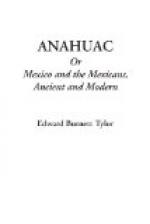Cheap as Mexican revolutions are in actual bloodshed, we must recollect what they bring with them. Thousands of deserters prowling about the country, robbing and murdering, and spreading everywhere the precious lessons they have learnt in barracks. We know something in England of the good moral influence that garrisons and recruiting sergeants carry about with them; and can judge a little what must be the result of the spreading of numbers of these fellows over a country where there is nothing to restrain their excesses! As for the soldiers themselves, one does not wonder at their deserting, for they are in great part pressed men, earned off from their homes, and shut up in barracks till they have been drilled, and are considered to be tamed; and moreover their pay, as one may judge from the general state of the military finances, is anything but regular. People who understand such matters, say that the Mexicans make very good soldiers, and fight well and steadily when well trained and well officered. They are able to march surprising distances, day after day, to live cheerfully on the very minimum of food, and to sleep anyhow. This we could judge for ourselves. One thing there is, however, that they strongly object to, and that is to be moved much beyond the range of their own climate. The men of the plains are as susceptible as Europeans to the ill effects of the climate of the tierra caliente; and the men of the hot lands cannot bear the cold of the high plateaus.
Travellers in the United States make great fun of the profusion of colonels and generals, and tell ludicrous stories on the subject. There is also talk of the absurd number of officers in the Spanish-American armies, but we should not, by any means, confound the two things. In the United States it is merely a harmless exhibition of vanity, and an amusing comment on their own high-minded abnegation of mere titles. In Spanish America it indicates a very real and serious evil indeed.
Don Miguel Lerdo de Tejada, in his statistical chart for 1856, quoted above, estimates the soldiers in the Republic at 12,000, and the officers at 2,000, not counting those on half-pay. One officer to every six men; and among them sixty-nine generals. These are not mere militia heroes, walking about in fine uniforms, but have actual commissions from some one of the many governments that have come and gone, and are entitled to their pay, which they get or do not get, as may happen. Only a fraction of them know anything whatever about the art of war. They were political adventurers, friends or relatives of some one in power, or simply speculators who bought their commissions as a sort of illegitimate Government Annuities. The continual rebellions or pronunciamientos have increased the number of officers still further. Comonfort’s notion of degrading all the officers of the rebel army was a new and bold experiment. A very common course had been, when a pronunciamiento had been made anywhere against the then existing government, and a revolutionary army had been raised, for an amalgamation to take place between the two forces; intrigue and bribery and mutual disinclination to fight bringing matters to this peaceful kind of settlement. In this case, it was usual for the rebel officers to retain their self-conferred dignities.




